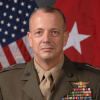John R. Allen

John R. Allen
John R. Allen, AOis a retired United States Marine Corps four-star General, and past Deputy Commander of U.S. Central Command, prior to serving as Commander of the International Security Assistance Force and U.S. Forces Afghanistan. On September 13, 2014, President Barack Obama appointed General Allen as Special Presidential Envoy for the Global Coalition to Counter ISIL. He was replaced in that role by Brett H. McGurk on October 23, 2015...
NationalityAmerican
ProfessionSoldier
Date of Birth15 December 1953
CountryUnited States of America
The thing that I'm always left with is this overwhelming desire for people to be rooted and the only way that they feel rooted is through another person.
We don't see that the Taliban ultimately can succeed, and it's a combination both of what the international community can do to support Afghanistan, not just in the short term, but over the long term.
We're pursuing a strategic partnership with Afghanistan on the case of the United States and Afghanistan where we're going to push toward a future. It is the future that the Afghans desire with the United States. It is a future that the Afghans desire with the international community and we desire that as well.
And the narrative for the Taliban that they can wait us out is a flawed narrative. I think that the unambiguous international support for Afghanistan has been a very powerful message. You know, that was the message that came out of the NATO summit. We will not abandon Afghanistan.
There are tens of thousands of interactions every single day across Afghanistan between the Afghan troops and International Security Assistance Force. On most of those, every single day we continue to deepen and broaden the relationship we seek.
We're probably going to see some post-2014 military presence - some U.S. presence and a NATO presence - and while we've got much work to do in the next 29 months, we'll have additional time later for the continued professionalization of the Afghan security forces.
Al Qaeda has significance beyond its numbers, frankly. And so for us, our 24-hour-a-day objective is to seek out those al Qaeda cells. And, as we seek them out, to target them and eliminate them. And we're doing that 24 hours a day.
Al Qaeda has come back. Al Qaeda is a resilient organization. But they're not here in large numbers. But al Qaeda doesn't have to be anywhere in large numbers.
I can't spend a lot of time worrying about the numbers at home. I've got to focus on the mission.
I seek as much as I can to mitigate risk.
And across Afghanistan, every single day, Afghan soldiers, Afghan police and ISAF troops are serving shoulder-to-shoulder in some very difficult situations. And our engagement with them, our shoulder-to-shoulder relationship with them, our conduct of operations with them every single day defines the real relationship.
Planning is really the hallmark of any large military formation, and it's typically a weakness in new formations and new armies.
There is a direct line relationship between what happened in Afghanistan in the work up to 11 September 2001 and what we're doing in Afghanistan today.
We dont see that the Taliban ultimately can succeed, and its a combination both of what the international community can do to support Afghanistan, not just in the short term, but over the long term.